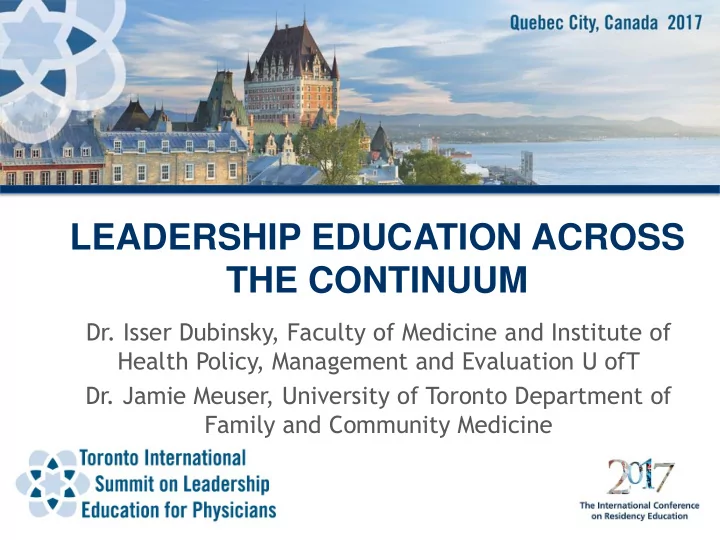

LEADERSHIP EDUCATION ACROSS THE CONTINUUM Dr. Isser Dubinsky, Faculty of Medicine and Institute of Health Policy, Management and Evaluation U ofT Dr. Jamie Meuser, University of Toronto Department of Family and Community Medicine
I, Isser Dubinsky, have/had an affiliation (financial or otherwise) with a pharmaceutical, medical device or communications organization. (Hay Group Health Care Consulting) Isser Dubinsky a eu une affiliation (financière ou autre) avec une entreprise pharmaceutique, un fabricant d’appareils médicaux ou un cabinet de communication. (Hay Group Health Care Consulting) 2
Dr. Jamie Meuser does not have an affiliation (financial or otherwise) with a pharmaceutical, medical device or communications organization. Dr Jamie Meuser n’a aucune affiliation (financière ou autre) avec une entreprise pharmaceutique, un fabricant d’appareils médicaux ou un cabinet de communication. 3
AGENDA Educational Objectives Introductions/Experience Learning Goals “Education” “Continuum” 4 tislep.pgme.utoronto.ca
Educational Objectives - Share information on attendees’ organizations leadership education “across the continuum” -Share information gleaned from the literature - Critical analysis of what’s available and what’s needed -Suggest opportunities for improvement (including content, “sharing”, evaluation, outcome studies etc.) 5 tislep.pgme.utoronto.ca
Introductions/Experience - what worked (or didn’t) - your “ideal” model(s) 6 tislep.pgme.utoronto.ca
Education Formal -Faculty of Medicine -Other Informal -mentorship/role model - ”on the job” training 7 tislep.pgme.utoronto.ca
Continuum -undergraduate -postgraduate -continuing professional development 8 tislep.pgme.utoronto.ca
CanMeds 9 tislep.pgme.utoronto.ca
The Canadian Literature/Experience -U of T -undergrad SLI -postgrad SLI -other faculties (e.g. Rotman) -CPD 10 tislep.pgme.utoronto.ca
Canadian Literature/Experience McGill University -undergrad (see Benrimoh et al- Advocacy and Leadership) 11 tislep.pgme.utoronto.ca
McMaster U. Emerging Health Leaders Program -undergrad, graduate and medical residents -non-degree, “residential“ 12 tislep.pgme.utoronto.ca
International Literature “Leadership Development Programs for Physicians: A Systematic Review” Frich et al JGIM 2014 -lit search -35 programs -multiple learning methods -only 6 demonstrated positive organizational outcomes - 13 tislep.pgme.utoronto.ca
International “Physicians as Managers of Health Care Delivery and the Implications for Postgraduate Medical Training: A Literature review “ Busari et al Teaching and Learning in Medicine 2011 -lit review -most existing programs in North America/FM -lack evidence of impact of training but “improved knowledge and confidence” -suggest ideally in postgrad 14 tislep.pgme.utoronto.ca
Graduate Medical Education University of Toronto -Ob/Gyn -Family Medicine -Surgery 15 tislep.pgme.utoronto.ca
Graduate Medical Education “A Model for Physician Leadership Development and Succession Planning” Dubinsky, Feerasta and Lash Healthcare Quarterly 2015 -focus on experiential learning 16 tislep.pgme.utoronto.ca
Graduate Medical Education “An Educational Package to Facilitate Leadership Development in Graduate Medical Education” Bohnen, J et al 2015 - ”how to” guide 17 tislep.pgme.utoronto.ca
GRADUATE MEDICAL EDUCATION “Implementing a Pilot Leadership Course for Internal Medicine Residents: Design Considerations, Participant Impressions, and Lessons Learned” Blumenthal et al BMC Medical Education 2014 -focus on 2 nd year medical residents -large/small group teaching -weekly 2-3 hours sessionsX4 weeks 18 tislep.pgme.utoronto.ca
Graduate Medical Education “Administration and Leadership Competencies: Establishment of a National Consensus for Emergency Medicine” Thoma et al CJEM 2015 -consensus document on core admin and leadership competencies as “guide” for residency program directors 19 tislep.pgme.utoronto.ca
Australia University of Queensland Medical Leadership Program -3 of 4 years of undergrad -evenings and weekends -practical component 20 tislep.pgme.utoronto.ca
Continuing Professional Development (CPD) Similarities to UG/PG • Variety of approaches – formal and informal • Lack of data on outcomes Differences • Perceived needs become clearer, unperceived needs become perceived • Importance of context to determination of needs • Expectations of colleagues • System need as a driver 21 tislep.pgme.utoronto.ca
System developments driving change • Recognition of transformative potential of primary care - larger groups - emergence of networks - local system-level identification of needs and oversight of implementation • Practice-based QI as a standard of care - key roles of MD • Identification and expression of needed skills - checklist format for documenting 22 tislep.pgme.utoronto.ca
A practical expression of leadership skills “A Model for Physician Leadership Development and Succession Planning” Dubinsky, Feerasta and Lash Healthcare Quarterly 2015 • Naming and grouping of attributes • Position accountabilities related to attributes • Relevant experience related to attributes • Possible questions to sample achievement and reflection 23 tislep.pgme.utoronto.ca
Models of MD Leadership Education in CPD Self-funded • PLI, Royal Roads, American Association for Physician Leadership, Canadian Society of Physician Leaders • Universities – Health Science faculties, business faculties • Courses, certificates, Master’s programs • In-person, online, executive and hybrid models 24 tislep.pgme.utoronto.ca
Models of MD Leadership Education in CPD Externally funded • Organized by government (e.g. AB), local health system (e.g. cancer care in MB), medical associations, universities (academic leadership) • Focused need vs broad-based curriculum • Formal and informal (e.g. mentorship models) 25 tislep.pgme.utoronto.ca
3 Key Messages 1.Lack of formal programs (UG/PG) 2.Trend of increasing prevalence 3.Highly context dependent 26 tislep.pgme.utoronto.ca
3 considerations for moving forward 1.Research on outcomes necessary 2.Opportunities for curriculum development 3.Could Canada lead the world? 27 tislep.pgme.utoronto.ca
For discussion… What needs to be changed about what we’re already doing? - U/G - P/G - CPD What educational opportunities need to be created? - Formal - Informal 28 tislep.pgme.utoronto.ca
THANKS TO ALL OF YOU!!! 29 tislep.pgme.utoronto.ca
Recommend
More recommend